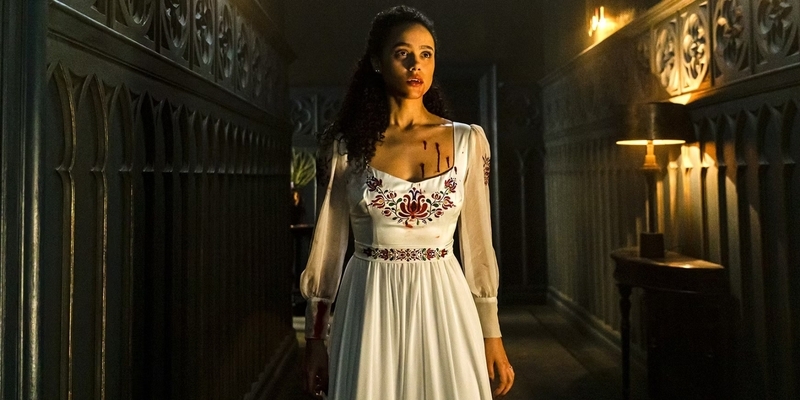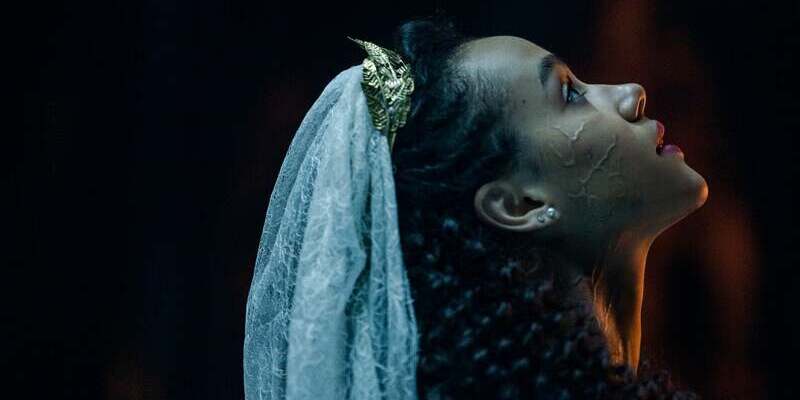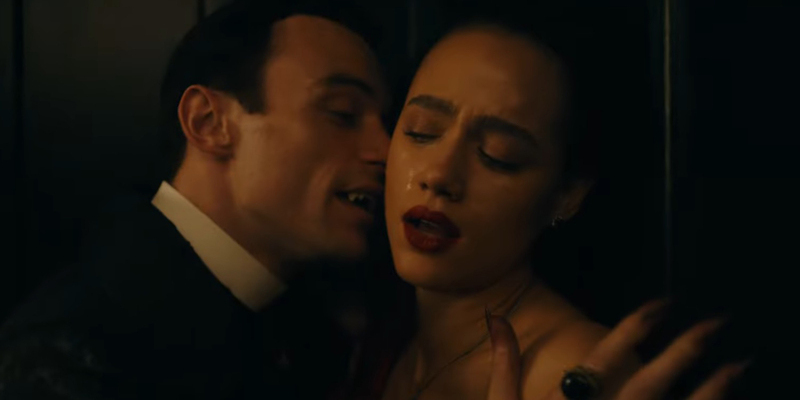
Review by
Eric Hillis
Directed by: Jessica M. Thompson
Starring: Nathalie Emmanuel, Thomas Doherty, Hugh Skinner, Sean Pertwee, Courtney Taylor, Alana Boden,
Stephanie Corneliussen

Every good Dracula movie has that iconic moment where the camera
dollies into the vampire as he announces himself with the words "I
am…Dracula." But The Invitation isn't a good Dracula
movie. It's not even a mediocre Dracula movie. I'm not sure it's even a
Dracula movie. The Count's name is never actually uttered, but the movie
is set in Whitby, and in the grounds of "New Carfax Abbey", and there
are characters called Jonathan Harker, Lucy and Mina. There's a butler
played by Sean Pertwee whose name is "Mr. Fields," so he's
clearly meant to be Renfield, but that name never gets mentioned either
- The Invitation is the Pro Evolution Soccer of
Dracula movies. This is baffling, as the intellectual property of
Dracula exists in the public domain, meaning that anyone can make a
Dracula movie if they so wish, and many have through the decades.
The Invitation is a Sony production, and my best guess is
that the studio came to a gentlemen's agreement with Warner Bros - who
have been trying to reboot Dracula recently, along with producing a
Renfield movie – not to use the Count's name. They could have at least
pulled the old Count Alucard trick.

The wealthy vampire who resides in New Carfax Abbey and who definitely
isn't Dracula, and let's hear no more of such crazy talk, is Walter (Thomas Doherty), a dashingly handsome cad, as vampires tend to be. The invitation of
the title is granted to working class New Yorker Evie (Nathalie Emmanuel) in the clumsy form of a DNA test left in a bag she swipes from her
catering job. How did Drac…sorry, Walter know she'd take the bag, let
alone go ahead and do the DNA test? Stop asking such uncomfortable
questions smartass. Anyway, the mixed-race Evie learns that she has very
rich and very white relations in the English countryside, and one of
them, cousin Oliver (Hugh Skinner, channeling Reginald Denny, I
say old chap and all that), just happens to be in NYC on business. Evie
meets up with her newfound toff relative, who insists she travel to
Whitby for a wedding on the grounds of Carfax, which definitely isn't
Dracula's gaff and bears only a coincidental relation to the mansion
mentioned in Bram Stoker's novel.
Cynical at first, Evie gets off on a bad footing with the Abbey's
butler, who definitely isn't Renfield, when she stands up for the
servants he's being a condescending git towards. Maybe this family
reunion was a bad idea. But when hunky Drac…Walter shows up, Evie
changes her mind and starts playing with her hair. It's not long before
any feminist principals Evie might have possessed go out the window as
she allows Walter to turn her into his plaything, dressing her up in
lavish gowns and deciding she will be his bride, regardless of her own
opinion on the matter.

Initially it seems The Invitation might be a feminist
riff on Get Out, with Evie lured into this patriarchal realm, but Evie is such a
shallow and superficial character that this notion is completely
undermined. Before travelling to England, Evie puts on a front about how
she's not going to be seduced by this world of privilege, to which her
obligatory sassy black friend (Courtney Taylor) nods in
agreement. But she's barely in the door of Carfax when she begins to
fall in love with this world of wealth, and her attraction to Walter
seems based merely on his looks and his bank balance. It's very hard to
care about Evie's predicament as she seems like she might be quite happy
to become the immortal bride of a rich, handsome bloodsucker.
The Invitation was likely never going to be a great
vampire movie, but it had the potential for campy fun. Unfortunately
it's a wavelength director Jessica M. Thompson - whose only
previous credit is 2017's The Light of the Moon, a very serious drama about sexual assault – never tunes into. The
movie is criminally bland in its visuals – any cinematographer who
lights a Gothic horror in teal and amber should be walled in a dungeon –
and the dull aesthetic is matched by the one-note performance of
Emmanuel, who to be fair, is saddled with a one-dimensional protagonist.
Only Danish model Stephanie Corneliussen seems to understand what
type of movie she's really in. She plays one of Drac…Walter's jealous
brides and has an absolute blast vamping it up.

Dracula has always been an anti-establishment figure, a symbol of
social and sexual liberation, so to turn the Count into a metaphor for
British imperialism is to completely miss the point of Irish
literature's most famous creation. Much of the fun of Dracula movies
comes from seeing the Count weasel his way into the British aristocracy
and cause chaos from within ("He's in the house!" and all that). This
cheap subversion in an effort to score timely talking points will have
Dracula turning in his grave.

